Three Years of Change: How “WE STOP FGM/C” Transformed Chicago’s North Side
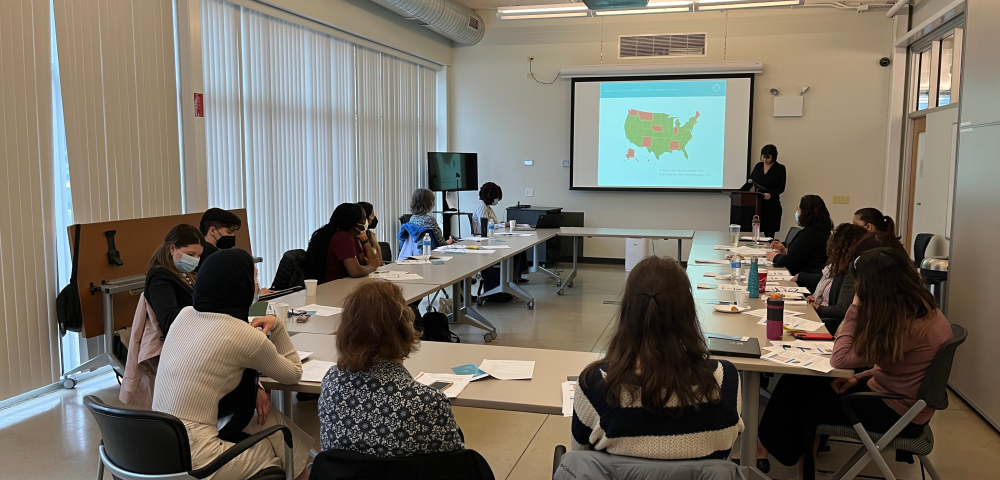
"WE STOP FGM/C" trainer Lisa Brett leads the class, presenting a striking map highlighting FGM/C prevalence across the U.S. – shedding light on an often-overlooked issue.
Published 11/18/2024
In 2021, AHA Foundation was awarded a three-year federal grant from the Department of Justice to implement its ambitious “WE STOP FGM/C” program in Chicago’s North Side.
Our vision was clear: empower Chicago’s North Side communities to prevent female genital mutilation/cutting (FGM/C) and address its devastating consequences. To accomplish this, AHA launched initiatives to raise awareness of the harmful consequences of FGM/C, train hundreds of frontline professionals, and build strong collaborations within the community. Equally important, we aimed to ensure that the knowledge and skills we imparted would continue to benefit Chicago’s North Side communities long after the program concluded.
While wrapping this groundbreaking initiative this fall, we had the pleasure of interviewing Oluwadamilola (Dami) Alabi, one of our dedicated trainers who has been with the program since the beginning. Read on to discover Dami’s firsthand experiences and the lasting impact of “WE STOP FGM/C.”
AHA Foundation: Why was Chicago’s North Side chosen as the launch site for this program?
Oluwadamilola Alabi: FGM/C remains an urgent issue globally, but in places like Chicago, it persists silently within communities lacking awareness and support systems to address it. Chicago’s North Side was chosen as the program’s launch site due to its sizeable impacted population, immigrating from regions where FGM/C is more prevalent.
AHA Foundation: Could you share the main challenges the AHA team faced during the program’s implementation and the strategies you employed to overcome them?
“One challenge arises from the dual nature of FGM/C as both a cultural and legal issue. Although there are laws that prohibit FGM/C, frontline professionals often struggle with the legal implications of reporting such cases while also trying to maintain trust and confidentiality with their clients.”
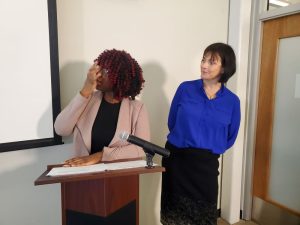
Dami Alabi (left) and Lisa Brett (right), two of our dedicated staff members, lead an anti-FGM/C training session at the launch of our “WE STOP FGM/C” program in Chicago.
Oluwadamilola Alabi: The most significant challenges in raising FGM/C awareness among frontline professionals included a general lack of knowledge about its prevalence and difficulty in identifying or responding to cases.
To address this knowledge gap, we implemented comprehensive training programs covering the medical, psychological, and social aspects of FGM/C. These trainings utilized case studies and role-playing tools to enhance understanding and preparedness.
One challenge arises from the dual nature of FGM/C as both a cultural and legal issue. Although there are laws that prohibit FGM/C, frontline professionals often struggle with the legal implications of reporting such cases while also trying to maintain trust and confidentiality with their clients. To address this, our training provided clear guidance on the legal framework, mandatory reporting obligations, and strategies to ensure survivor safety and confidentiality.
AHA Foundation: How was the program tailored to the community’s unique needs?
Oluwadamilola Alabi: To meet the needs of Chicago’s North Side communities, we partnered with and co-facilitated workshops alongside several local service providers and organizations. This collaborative approach allowed us to significantly expand the program’s reach while ensuring its sustainability and effectiveness. This also made it easier to engage professionals and community members in raising awareness about FGM/C and made the topic relevant to the community’s needs.
“When we started, there was little to no infrastructure to address FGM/C in this area. From the ground up, we’ve built a robust network of experts who empower communities and local service providers to detect and respond to FGM/C cases effectively. This includes establishing a support group for survivors.”
AHA Foundation: What are some of the program’s key achievements?
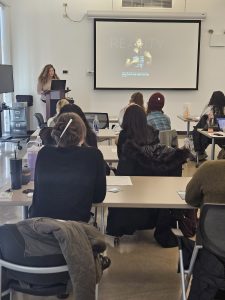
Michele Hanash, AHA Foundation’s Director of Policy and Women’s Programs, conducting an impactful training session in Chicago alongside our partners at Tapestry 360.
Oluwadamilola Alabi: Over the past three years, we’ve made significant strides through education, awareness, and capacity building, as well as by leveraging existing healthcare and social services.
When we started, there was little to no infrastructure to address FGM/C in this area. From the ground up, we’ve built a robust network of experts who empower communities and local service providers to detect and respond to FGM/C cases effectively. This includes establishing a support group for survivors.
We provided training to frontline professionals like healthcare providers, social workers, victim advocates, and law enforcement to help them build the capacity to detect, assess, and respond to FGM/C cases.
We employed a train-the-trainer model, offering a hands-on teaching experience designed to equip frontline professionals with the skills to educate others. This approach ensures that even after the program concludes, its impact continues to grow as these trainers go on to train more people. Other significant accomplishments include establishing a Chicago taskforce steering group that united anti-FGM/C advocates across sectors to drive the program’s success and awareness-raising efforts through events and media campaigns. Through these efforts, we reached thousands, helping reduce stigma and encouraging community action against FGM/C. One of the FGM/C survivors we referred to an OBGYN doctor we trained wrote to me, sharing: “The doctor was very nice, knowledgeable, and supportive. I thank you and really appreciate your guidance and care.”
“Partner organizations also helped build trust within the community through their existing relationships, encouraging participation in FGM/C awareness initiatives. By integrating FGM/C prevention into their frameworks and offering feedback, these organizations ensured the program’s sustainability and long-term impact on the community. “
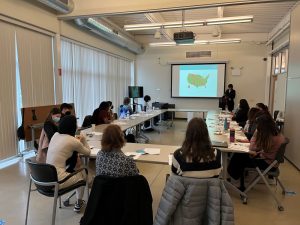
Lisa Brett, our dedicated trainer, leads an anti-FGM/C training session in Chicago, March 2022, equipping participants with vital knowledge and tools to combat FGM/C in their communities.
AHA Foundation: How have the partner organizations helped with this program?
Oluwadamilola Alabi: Partner organizations, such as Tapestry 360 Health, a federally qualified health center that offers affordable and comprehensive primary care and behavioral healthcare services in Chicago’s North Side, and Forma, a nonprofit that offers mental health clinical services to women adversely affected by FGM/C have been crucial in supporting the program.
Tapestry contributed to training sessions by providing expertise and co-facilitating workshops. They provided valuable resources, including venues for training sessions, materials, and access to their networks. Their involvement allowed the program to tailor messaging and outreach efforts to resonate with the specific cultural and social dynamics of the North Side community.
Forma’s executive director, Joanna Vergoth, a licensed clinical social worker and a nationally renowned psychoanalyst, collaborated with AHA to deliver comprehensive and culturally sensitive training to mental health providers. This training imparts specialized skills needed to offer direct services to FGM/C survivors.
Partner organizations also helped build trust within the community through their existing relationships, encouraging participation in FGM/C awareness initiatives. By integrating FGM/C prevention into their frameworks and offering feedback, these organizations ensured the program’s sustainability and long-term impact on the community.
We will use our model as a blueprint for other cities; with the right support and dedication, significant change is possible.
AHA Foundation: How were the training workshops received by those who attended them?
Oluwadamilola Alabi: The feedback from trainees was overwhelmingly positive. Many were surprised by their initial lack of awareness about FGM/C in the U.S. Attendees appreciated the program for shining a light on this critical issue. They found the provided resources incredibly valuable, enhancing their ability to address FGM/C effectively.
One example of the training’s impact and real-world application is the inclusion of FGM/C screening questions in Tapestry’s Electronic Medical Record. In our post-training surveys, participants reported feeling empowered to discuss and address FGM/C risks, demonstrating the program’s immediate impact.
On the Frontlines: Quotes from FGM Training Participants
-
“Prior to taking this course, I was unaware of how prevalent this practice was within the United States and more specifically the Chicagoland area. I now have the tools, knowledge and resources needed to help address these concerns with potential at-risk clients, educate, and direct them to the appropriate centers, agencies, and authorities.”
-
“There is help for these children and families who believe or are under great pressure by societal values and traditions to perform FGC on their daughters. There are risk assessment tools and the AHA Foundation that we can rely on to help identify these families and get them the support services needed to help them. It begins with asking the right questions and being made aware of this practice within our community so that we can identify those most at-risk.”
-
“I did not know that there are so many people in the Chicago area who have experienced this. There are some countries not in Africa where this may be a custom as well.”
-
“Just being aware of this phenomenon opens my eyes in case I’m ever confronted with such a situation. Now I know what to listen for, where to get help for interventions, how to accompany persons involved.”
AHA Foundation: What are some key lessons that could benefit other cities or organizations conducting or attempting to conduct similar anti-FGM/C initiatives?
Oluwadamilola Alabi: We’ve learned several important lessons that could really help other initiatives. Here are some of the key takeaways:
-
-
- Tailor every aspect of your program to fit the unique cultural and local context. This makes your efforts more impactful.
- Use continuous feedback to refine your strategies, ensuring they stay effective and relevant.
- Educate the community to change attitudes towards FGM/C. Highlight the consequences and the support available.
-
By embracing these insights, other cities and organizations can strengthen their initiatives, aiming not just to combat FGM/C but to foster lasting change for the protection and empowerment of women and girls.
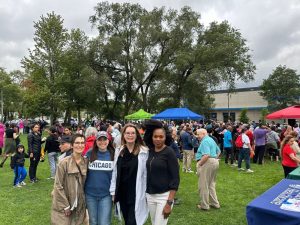
Members of our steering committee attended Law Enforcement National Night Out, where they connected with frontline service providers to raise awareness about FGM/C. Engaging in meaningful conversations, they highlighted the importance of education and shared about our specialized training program to an enthusiastic audience eager to learn more.
AHA Foundation: What is next for the program in Chicago’s North Side?
Oluwadamilola Alabi:There’s strong support for continuing efforts in Chicago. The taskforce steering committee will keep meeting to raise awareness and focus on community outreach. Organizations that have been trained and have integrated FGM/C prevention into their work will carry on with their initiatives. Additionally, Tapestry will continue screening their patients for FGM/C, further embedding these efforts into their services. The goal is to maintain the program’s momentum and impact through these ongoing activities and collaborations.
AHA Foundation: What will you carry forward from this experience?
Oluwadamilola Alabi: As the program wraps up, I’ll take with me the deep understanding that community engagement, cultural sensitivity, and cross-sector collaboration are crucial in the fight against FGM/C. These elements empower both individuals and organizations to drive lasting change for the health and well-being of women and girls. Together, with compassion and unity, we can create a world where every woman and girl lives free from the threat of FGM/C and is empowered to thrive.
Learn more about AHA’s trainings:
-
-
“The best cure is prevention. We can’t just continue letting FGM/C happen and reacting to its awful consequences after the fact. We have to do better.” AHA’s anti-FGM/C trainer Oluwadamilola Alabi on her mission to end FGM/C in Chicago North Side
-
AHA Foundation fights FGM/C on the ground in Chicago: update on our federally-funded anti-FGM/C program
-
Trainings for Professionals Encountering Female Genital Mutilation (FGM), Forced Marriage and Honor Violence
-

